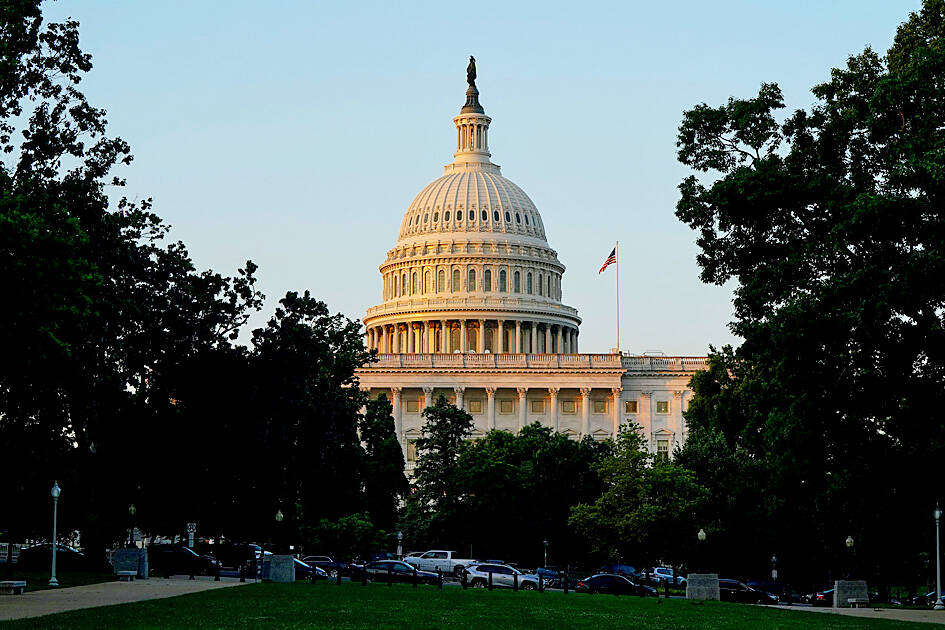US President Donald Trump’s US$4.5 trillion tax cut bill prevailed in a crucial US Senate test vote after hours of negotiations between US Vice President J.D. Vance and Republican Party leaders and holdouts.
The 51-49 vote, which was held open for about four hours, is a sign that Republican leaders are resolving the infighting over portions of the legislation and moving toward meeting Friday’s deadline the US president has set for passage.
US Senate Majority Leader John Thune and his lieutenants might still need to tweak portions of Trump’s signature economic legislation to win the 50 votes it needs to pass the Senate.

Photo: Reuters
However, the Senate on Saturday voted to begin debate on the legislation just hours after party leaders unveiled the latest version of the massive tax and spending package.
Two Republicans — Thom Tillis of North Carolina and Rand Paul of Kentucky — voted against the motion. A third, Ron Johnson of Wisconsin, switched his vote after meeting with Vance and Thune.
Johnson told reporters that Trump and Senate leaders agreed to support an amendment to phase out the 90 percent Medicaid match for the expansion population under the Affordable Care Act.
Johnson said it would hopefully lead to hundreds of billions in additional savings. However, that plan could result in a revolt from moderates in the US House of Representatives and the Senate, given many states now rely on the funding.
Trump had golfed earlier in the day with Paul, a frequent foe. The US president, who had been monitoring the Senate action from the Oval Office, swiftly threatened to find a Republican challenger for Tillis’ seat.
Democrats have now demanded a full reading of the bill text, which could be pushed to a final vote today.
The bill includes about US$4.5 trillion worth of tax cuts, according to the non-partisan Joint Committee on Taxation.
However, Republicans are aiming for only US$693 billion of those tax reductions to count in the official bill cost — assuming they are able to successfully use a budget gimmick that would not count the extension of Trump’s first-term cuts in the price tag.
Despite broad Republican support for the tax cuts and spending increases for immigration enforcement and defense at the core of the package, party leaders have struggled to balance competing demands from the Republican Party’s discordant ideological factions.
Conservatives are demanding larger spending cuts to offset the tax cuts. Moderates are worried about the scale of proposed cuts to safety-net programs such as Medicaid and food stamps. Some senators from states with significant renewable energy industries are trying to soften the rapid phase-out of green energy tax credits.
Thune and other party leaders have also been trying to resolve lesser skirmishes, such as one on a provision to block states from regulating artificial intelligence.
A new draft of the bill unveiled early Saturday morning attempted to win over moderates on the Medicaid issue and conservatives on renewable energy.

President William Lai (賴清德) yesterday criticized the nuclear energy referendum scheduled for Saturday next week, saying that holding the plebiscite before the government can conduct safety evaluations is a denial of the public’s right to make informed decisions. Lai, who is also the chairman of the Democratic Progressive Party (DPP), made the comments at the party’s Central Standing Committee meeting at its headquarters in Taipei. ‘NO’ “I will go to the ballot box on Saturday next week to cast a ‘no’ vote, as we all should do,” he said as he called on the public to reject the proposition to reactivate the decommissioned

US President Donald Trump on Friday said that Chinese President Xi Jinping (習近平) told him China would not invade Taiwan while Trump is in office. Trump made the remarks in an interview with Fox News, ahead of talks with Russian President Vladimir Putin over Moscow’s invasion of Ukraine. “I will tell you, you know, you have a very similar thing with President Xi of China and Taiwan, but I don’t believe there’s any way it’s going to happen as long as I’m here. We’ll see,” Trump said during an interview on Fox News’ Special Report. “He told me: ‘I will never do

The Legislative Yuan yesterday approved an aid and recovery package authorizing the government to allocate up to NT$60 billion (US$1.99 billion) for regions hit by Typhoon Danas and subsequent torrential rains last month. Proposed by the Executive Yuan on Aug. 7, the bill was passed swiftly after ruling and opposition lawmakers reached a consensus in inter-party talks on relief funding and assistance for disaster-stricken areas. The package increases the government’s spending cap from the originally proposed NT$56 billion to NT$60 billion, earmarked for repairing and rebuilding infrastructure, electricity systems, telecommunications and cable TV networks, cultural heritage sites and other public facilities.

In his National Day Rally speech on Sunday, Singaporean Prime Minister Lawrence Wong (黃循財) quoted the Taiwanese song One Small Umbrella (一支小雨傘) to describe his nation’s situation. Wong’s use of such a song shows Singapore’s familiarity with Taiwan’s culture and is a perfect reflection of exchanges between the two nations, Representative to Singapore Tung Chen-yuan (童振源) said yesterday in a post on Facebook. Wong quoted the song, saying: “As the rain gets heavier, I will take care of you, and you,” in Mandarin, using it as a metaphor for Singaporeans coming together to face challenges. Other Singaporean politicians have also used Taiwanese songs